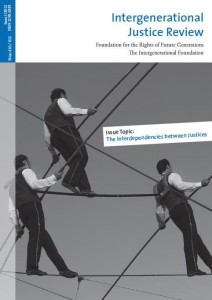A new edition of the Intergenerational Justice Review (IGJR) is now in development, and is appealing to all researchers and academics to submit papers. Antony Mason, IGJR Guest Editor, provides the details
The topic for the new edition of the Intergenerational Justice Review is “Getting Heard: Youth Representation in the Modern World”.
The Occupy movement, the Spanish “¡Democracia Real YA!”, the Arab Spring and uprisings at Taksim Square in Istanbul – all could be considered manifestations of younger generations protesting against entrenched and unrepresentative political systems in a manner reminiscent of the youth movements of the 1960s.
Are we witnessing a revival of youth activism? Where will this lead, and is this the only way to improve youth representation in a world where governments seem only too ready to pander to the voting power of older generations – which is reinforced not only by the latter’s numbers (demographic ageing) but also by their willingness to turn out to vote?
Youth: in danger of being ignored
Young people – utterly disenchanted with politics, perhaps – have shown a growing reluctance to vote, thus only adding to their under-representation. What – if anything – should be done to persuade more of them to vote?
It has been suggested that electronic or online voting will improve youth participation. What is the evidence for this, and what might be the downsides?
Other solutions are also offered. Youth quotas, for example, could tweak the balances to ensure that young people are adequately represented when voting power alone fails to deliver. Some would argue, however, that the need for this kind of manipulation is symptomatic of a dysfunctional democratic system. It is the system itself that needs reform.
Reforms to the voting system could adjust the age-distribution of representation, for instance by offering proxy votes to parents to vote on behalf of – and in the interests of – their children. Votes at 16? Why not votes at 14 – or votes at any age, with the proviso of being able to pass a test of competence?
The Intergenerational Justice Review 2014/2015 is open to submissions on all these topics – or indeed any in the same vein that explores the subject of “Getting Heard: Youth Representation in the Modern World”.
Deadline for submissions: 1 November 2014
Projected date of publication: March/April 2015
To see the full Call for Papers, please follow this link.
The Intergenerational Justice Review
The Intergenerational Justice Review has been published by the Stuttgart-based think tank the Foundation for the Rights of Future Generations (FRFG) since 2002.
The FRFG, founded in 1997, has played a prominent and highly respected role in gathering and supporting research in intergenerational issues at the academic level – research that usually falls within the compass of university departments of law, politics and philosophy. The Intergenerational Justice Review (IGJR) reflects this academic focus. Articles, submitted by senior academics and researchers in the field, are peer-reviewed and published only on the recommendation of two reviewers.
The Intergenerational Foundation is delighted to be joining forces with the FRFG to produce the Intergenerational Justice Review for a second time, following successful collaboration for the 2012 edition – an edition entitled “The Interdependencies between Justices”, which explores the tension between inter-generational and intra-generational analysis.
Also: the Intergenerational Justice Prize 2014
Note that Youth Movements is also the subject of the Intergenerational Justice Prize 2013/2014.
The prize, likewise jointly promoted by the FRFG and IF, carries a total value of €10,000 – generously endowed by the Stiftung Apfelbaum – which will be divided among the winning entrants.
Papers submitted for the Prize will also be considered for the Intergenerational Justice Review 2014/2015.
